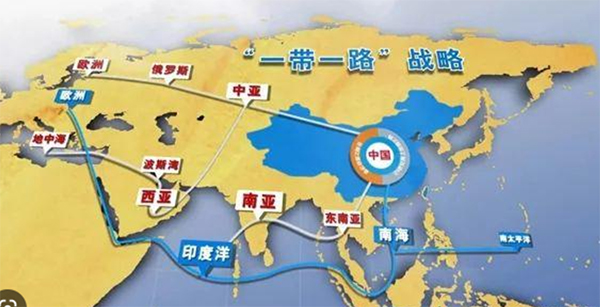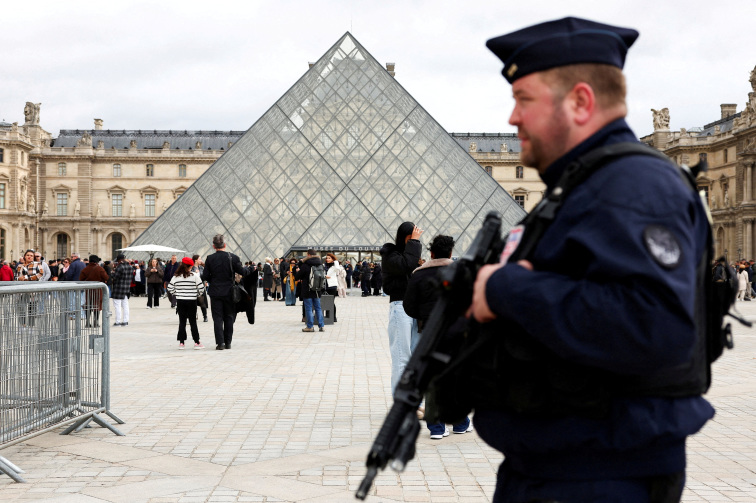Composite image: Hu Chunhua and Wang Yang are rumoured to become successors.
[People News] Following the conclusion of the Fourth Plenary Session of the Communist Party of China, several members of the Politburo Standing Committee and high-ranking officials have published signed articles in the key news section of the official media outlet, People's Daily. Notably, other official media and social media have highlighted in their main titles that a specific individual published a signed article in People's Daily, either omitting or adding the article title afterwards. This represents a slight shift from practices observed over the past decade.
So far, which Politburo Standing Committee members and high-ranking officials have published articles in People's Daily?
On October 30, Premier Li Qiang published an article titled "Guiding Principles for Economic and Social Development during the 14th Five-Year Plan Period."
On October 31, Wang Huning published an article titled "Deepening Economic System Reform to Promote High-Quality Development."
On November 3, Cai Qi, Secretary of the Central Secretariat, published an article titled "Continuously Advancing Comprehensive Strict Governance of the Party."
On November 4, Vice Premier Ding Xuexiang published an article titled "Main Goals for Economic and Social Development during the 14th Five-Year Plan Period."
On November 5, State Councillor and Foreign Minister Wang Yi published an article titled "Promoting the Building of a Community with a Shared Future for Mankind."
It is evident that the publication of these articles by high-ranking officials follows the order of their ranking within the Communist Party. What does the concentration of these officials' articles in People's Daily signify? Previously, the public account Zhengzhi Jun under the Beijing Youth Daily pointed out that after analysing the pattern of the seven Standing Committee members' articles in People's Daily, it was found that they prefer to publish articles concentrated after the Central Committee plenary session, and this instance aligns with that pattern.
Why is this the case? Typically, after the Central Committee plenary session of the Communist Party of China, the People's Publishing House publishes an interpretative version of the plenary documents, commonly known as the 'Ministerial Edition.' This edition features interpretations from officials at the ministerial level and above, organised by national-level, vice-national-level, ministerial, and vice-ministerial rankings. Following its publication, the corresponding interpretative articles are subsequently published in the People's Daily.
In essence, the articles interpreting the Fourth Plenary Session by the aforementioned members of the Standing Committee, senior officials, or other high-ranking officials have already been compiled and published, and only after that did the People's Daily release them one by one. News reports indicate that on October 29, several major state media outlets announced the publication of study and guidance materials on the spirit of the Fourth Plenary Session, and it was the following day that Li Qiang began to publish his articles. These high-ranking officials' writings will serve as a resource for lower-level officials to understand and learn the spirit of the Fourth Plenary Session, and they will also provide a foundation for officials at all levels to create various subpar speeches and articles.
As noted at the beginning, when these high-ranking officials' articles were reprinted by other state media and social media, the main titles explicitly stated that a certain individual had published a signed article in the People's Daily. This marks a departure from the past decade, during which reports typically did not directly mention the names of Standing Committee members other than Xi in their titles.
For instance, after the conclusion of the Fifth Plenary Session of the 19th Central Committee of the Communist Party of China in October 2020, then Premier Li Keqiang and He Lifeng, Vice Chairman of the Chinese People's Political Consultative Conference and Director of the National Development and Reform Commission, published articles titled 'Guiding Principles for Economic and Social Development during the 14th Five-Year Plan' and 'Main Goals for Economic and Social Development during the 14th Five-Year Plan' in the People's Daily. However, at that time, under the shadow of 'Xi's dominance', major media outlets did not include the phrase indicating that a certain individual had published a signed article in the People's Daily.
Such changes must be deliberate. Does this imply that the strengthening of 'central collective leadership' mentioned in the Fourth Plenary Session is being put into practice? And since 'central collective leadership' has taken precedence over 'Xi Yizun', does this suggest that Xi's power is waning, or is it true, as rumours have it, that he no longer wields significant authority?
Another intriguing development occurred before Li Qiang's (Li Qiang) post, on October 29, when Hu Chunhua (Hu Chunhua), Vice Chairman of the Chinese People's Political Consultative Conference (CPPCC), who has been more vocal since the rumors of Xi's stroke last July, published an article on the CPPCC website titled 'In-depth Study and Implementation of the Spirit of the Plenary Session to Promote High-Quality Development of the 14th Five-Year Plan', also addressing the '14th Five-Year Plan'. On the same day, several other CPPCC Vice Chairmen, including Shi Taifeng (Shi Taifeng), also released articles discussing the so-called spirit of the plenary session, but only Hu Chunhua's article garnered special attention from other media outlets.
It is noteworthy that Hu Chunhua, who is not a member of the Politburo, published his article on the study of the plenary session's spirit and the development of the '14th Five-Year Plan' before the articles from CPPCC Chairman Wang Huning (Wang Huning) and other Standing Committee members were released. In the hierarchy-conscious upper echelons of the CCP, isn't this unusual? Could it be that the previous odd signs and the rumours about Hu Chunhua being groomed to replace Xi are not baseless? And did the other CPPCC Vice Chairmen publish their articles on the same day to provide cover for Hu Chunhua?
Examining the attitudes of these high-ranking officials towards Xi in their published articles, some online analyses of the original texts indicate that Li Qiang's article mentions Xi Jinping only five times, reflecting a relatively indifferent stance; Cai Qi (Cai Qi) mentions him seven times, and his tone of flattery has notably diminished compared to previous instances; Wang Huning mentions him fourteen times, but as a sycophant who adapts like a chameleon, Wang's overt praise is not a reliable indicator of Xi's hold on power.
The most striking aspect is Hu Chunhua. After being demoted by Xi Jinping to the Chinese People's Political Consultative Conference during the 20th National Congress of the Communist Party of China, he mentioned Xi a remarkable 53 times in his article. Although the author has not seen Hu Chunhua's original text, the more than a thousand-word abridged version published on the official website of the Chinese People's Political Consultative Conference reveals that he referred to Xi Jinping 10 times.
Li Qiang and Cai Qi, who were promoted by Xi, tend to downplay his influence, while Hu Chunhua, who has been sidelined by Xi, openly praises him. What does this stark contrast signify? In the author's perspective, it likely reflects the true outcomes of the internal power struggles within the Communist Party of China. Hu's 'high-profile' endorsement of Xi may also serve to project a certain image to external observers, keeping the outside world confused about the internal power dynamics of the Communist Party. Otherwise, Hu's praise would lack substantial meaning.
(First published by People News) △











News magazine bootstrap themes!
I like this themes, fast loading and look profesional
Thank you Carlos!
You're welcome!
Please support me with give positive rating!
Yes Sure!